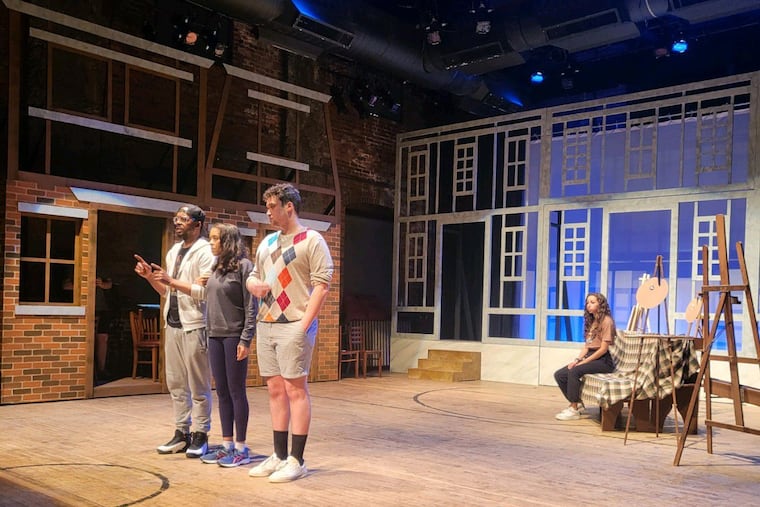With ‘Plum Bun,’ Philadelphia High School for Girls alum Jessie Redmon Fauset’s novel comes home
Theatre in the X and EgoPo Classic Theater have partnered to produce works centered on the Harlem Renaissance. An adaptation of Fauset's "Plum Bun: A Novel without a Moral" is the latest offering.

When it came to admitting highly qualified students, Bryn Mawr University, then an all-girls liberal arts college, knew a safe bet: award a full scholarship to the best scholar from Philadelphia High School for Girls, a premier academic magnet school.
But, in 1900, when Jessie Redmon Fauset graduated from Girls’ High as its valedictorian, Bryn Mawr didn’t welcome her. Fauset was Black.
Then-Bryn Mawr president M. Carey Thomas refused to admit Blacks or Jews.
It was that kind of steady racism and humiliation that Fauset, a novelist, turned to repeatedly in her work, including Plum Bun: A Novel Without a Moral, a 1928 novel about a white-passing Black Philadelphia woman.
Now Fauset’s work is home again — in Plum Bun, a world premiere play adapted from her novel and staged by Theatre in the X and EgoPo Classic Theater. The two Philadelphia companies have partnered this season to produce works centered on the Harlem Renaissance.
In Plum Bun, Angela, the protagonist, moves from Philadelphia to New York, where she passes for a white woman until she needs to reckon with the choices she has made.
“It happened a good amount,” said Walter DeShields, co-artistic director at Theatre in the X and director of Plum Bun. “Light-skinned Black folks, who couldn’t necessarily be determined to be Black, used it to their benefit. We know of Black women who passed for white, who used it to their advantage. But, at what cost?”
Attitudes have shifted, DeShields said. Someone passing may have once been described as a “race traitor,” he said, “but now we look at it with a bit more empathy. What is probably true is that it doesn’t happen as much anymore … plus we have a lot of biracial kids.”
Fauset’s work focused on the relentlessly striving Black middle class.
“Certainly, Black folks are all about how we get ahead — how we get ahead in this generation and how do we ensure that our children and grandchildren get ahead,” DeShields said. Meanwhile, “there is the constant critique of how poorly we are doing — how poorly our institutions treat us, our schools, our police, our banks — and how poorly we treat ourselves and how poorly we treat each other.”
The result is an intertwining of self-hatred and racism that forms the heart of play.
“Angela’s family [represents] forward progress,” DeShields said. “She’s coming from a family heading to the middle class. But it’s not enough for her. For her, being Black is sad. It’s tragic. For her to escape that tragedy means she has to go be white, because there’s freedom there and opportunity.”
But “we know you can’t run from yourself,” DeShields added. “You always return to yourself, but she doesn’t understand that.”
Angela heads to New York in the 1920s, which is also when Fauset moved there.
Fauset, who was born in 1882 in what is now Lawnside, Camden County, grew up in North Philadelphia, and died here in 1961, “was a major contributor to the Harlem Renaissance,” DeShields said. But, he said, she was not as well known as the men who made it famous, including poet Langston Hughes, musicians Duke Ellington and Fats Waller, and philosopher Alain Locke, a Central High School graduate.
DeShields and Lane Savadove, artistic director of EgoPo, collaborated to adapt Fauset’s novel. To play the role of Angela, they tapped Alexandria Orr, a Temple University theater student.
DeShields and Savadove chose to stage the play at Christ Church Neighborhood House in Old City. Before the building was built in 1915, the area had been a neighborhood for the city’s Black middle-income Philadelphians.
Knowing how deeply loyal Girls High alumni are, the two theater groups plan to honor Fauset’s alma mater with a special show April 26.
“Plum Bun,” by EgoPo Classic Theater and Theatre in the X, runs April 19-29 at Christ Church Neighborhood House, 20 N. American St., Phila. 267-273-1414 or egopo.org. Check with the theater for COVID-19 protocols. For other local events, visit inquirer.com/things-to-do-philly.